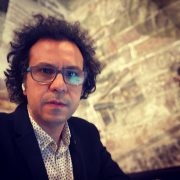
Our belief in science has a foundation.
Nobody believes scientists because they speak eloquently or herald people with a paradise. The foundation of your belief in science is the benefit you provide by using the practical tools and facilities produced by science and the evidential persuasion power you experience.
When someone says a water molecule is composed of two moles of hydrogen and one mole of oxygen, you can prove this in the lab in your high school and produce water with 2 moles of hydrogen and 1 mole of oxygen. You can also use an antibiotic when it says it’s suitable against bacteria. By using Google Earth, you can see your house’s picture; you also can travel and see your neighborhood and even intercity roads. From the plane, you can see that the horizon is slightly tilted. You experience that as a ship moves further away, first the lower part and then the masts disappear.
Science will convince you of the tools and proof. Science does not make you believe like different beliefs. Science makes you believe itself. You trust science; you don’t have faith in it.
As Aristotle points out, provability is the property of scientific knowledge, and he also highlights that not all information can be proven. The fact that people have different opinions or beliefs about unproven information stems from this unknown.
And since people can’t prove such kinds of stuff, they can only have faith in this unproven knowledge. Then they might transform this kind of knowledge ( existence, creation, creator, etc. ) into religions or beliefs.
They can create a god in their mind. And as a matter of fact, this is the case. We know that different deities and philosophies exist in different beliefs since there are no limits to humankind’s imaginations.
Whatever belief you have, you can never be sure of the truth of your own belief because belief is an unprovable knowledge.
Some philosophers claim that while it is impossible to reach this information with practical wisdom, intuitive intelligence can only be reached. Without getting into these discussions, let me get to the subject I want to talk about.
Beyond all this obscurity and provability,
- What about the feeling of faith in a person …
- The need for sanctuary….
- Prayer …
These are things that are good for the human brain. It is one of the different types of meditation. Belief in God is also an issue that relieves death anxiety.
Having faith enables a longer and higher quality of life in the human brain. We know that it increases oxytocin release.
We see similar benefits of belief in elements of different cultures, in the concept of indigenousness, in the conversation of the country and homeland.
To make life more stable, safe, and long sustainable, man’s cognitive evolution makes him love these beliefs. In short, beliefs are constantly existing, and different types emerge due to human beings’ needs
For people like us, the mindset that goes into disbelief can be disastrous for children, and they may feel empty. For them, they need a new belief in God, different from the God you imagined in your culture. It does not conflict with the environment and favors love.
It is the human brain that creates life or vita. And his creations must be respected. People can only be inspired elsewhere when creating their own faith.
But they should definitely not change “The mind” that is in the center; otherwise, man becomes a commodity.
A person who says that he takes the religion at the center of his life is drowned in darkness.
